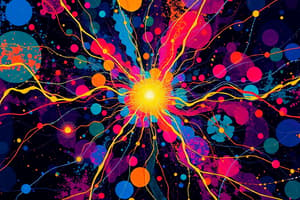Podcast
Questions and Answers
What is an action potential?
What is an action potential?
- A constant resting membrane potential
- A decrease in resting membrane potential
- A gradual and slow change in resting membrane potential
- A sudden and fast change in resting membrane potential (correct)
Which cells are capable of generating an action potential?
Which cells are capable of generating an action potential?
- Only muscle cells
- All types of cells
- Only neurons
- Neurons and muscle cells (correct)
When is an action potential generated?
When is an action potential generated?
- When a stimulus changes the membrane potential to the values of resting potential
- When a stimulus changes the membrane potential to the values of overshoot potential
- When a stimulus changes the membrane potential to the values of action potential
- When a stimulus changes the membrane potential to the values of threshold potential (correct)
What are the three phases of an action potential?
What are the three phases of an action potential?
What is the refractory period?
What is the refractory period?
Where is an action potential generated and propagated?
Where is an action potential generated and propagated?
What is a synapse?
What is a synapse?
How is a nerve impulse transmitted from the axon ending to the target tissue?
How is a nerve impulse transmitted from the axon ending to the target tissue?
Flashcards
Action Potential
Action Potential
A sudden and fast change in the resting membrane potential of a cell.
Threshold Potential
Threshold Potential
The specific voltage that must be reached for an action potential to occur.
Depolarization
Depolarization
The initial phase of an action potential where the membrane potential becomes more positive.
Overshoot
Overshoot
Signup and view all the flashcards
Repolarization
Repolarization
Signup and view all the flashcards
Refractory Period
Refractory Period
Signup and view all the flashcards
Synapse
Synapse
Signup and view all the flashcards
Neurotransmitters
Neurotransmitters
Signup and view all the flashcards
Study Notes
Action Potential: Definition, Steps, Phases, Refractory Period, Propagation, and Synapse
- Action potential is a sudden, fast, transitory, and propagating change of the resting membrane potential.
- Only neurons and muscle cells are capable of generating an action potential; that property is called the excitability.
- An action potential is generated when a stimulus changes the membrane potential to the values of threshold potential.
- An action potential has three phases: depolarization, overshoot, and repolarization.
- An action potential propagates along the nerve fiber without decreasing or weakening of amplitude and length.
- After one action potential is generated, neurons become refractory to stimuli for a certain period of time in which they cannot generate another action potential.
- The refractory period is the time after an action potential is generated, during which the excitable cell cannot produce another action potential.
- An action potential is generated in the body of the neuron and propagated through its axon.
- The speed of propagation largely depends on the thickness of the axon and whether it’s myelinated or not.
- A synapse is a junction between the nerve cell and its target tissue.
- Synapses are chemical, meaning that the nerve impulse is transmitted from the axon ending to the target tissue by the chemical substances called neurotransmitters (ligands).
- Each synapse consists of the presynaptic membrane, postsynaptic membrane, and synaptic cleft.
Studying That Suits You
Use AI to generate personalized quizzes and flashcards to suit your learning preferences.




